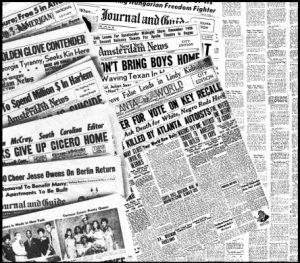 Protesting in a Foreign Language: The foreign-language press and dissent
Protesting in a Foreign Language: The foreign-language press and dissent
In collaboration with Istituto Centrale per la Catalogazione Unica (ICCU),Rome Université de Versailles Saint Quentin en Yvelines(CHCSC)
The foreign-language press is an extremely varied, complex phenomenon, specifically defined as the press printed in languages that are different from the official language(s) of the country where it is published. While often underestimated because they are perceived as marginal or even “foreign”, foreign-language periodicals account for a substantial portion of the national presses of most countries and contribute to the development of very important historicaland contemporary phenomena. Specifically, they can be used as an alternative way to spread ideas and practices both in the country where they are printed and transnationally.
The aim of the sixth international meeting of the Transfopress network (http://transfopresschcsc.wixsite.com/transfopress) is to come up with reflections on the role played by the foreign-language press in phenomena of protest and dissent, as well as in the experiences of political exile. Indeed, countless are the foreign-language periodicals that voiced political rebellion, criticized the local or foreign authorities, or were founded by insurgents. The conference will welcome papers dealing with this rich history. The possibilities of research are numerous and here are but a few examples of the periodicals that could be studied:
• the newspapers edited by Italian exiles during the Risorgimento or by German exiles after the revolution in 1848
• the foreign-language press published during the world wars by persecuted communities or national groups that wanted to support their own country abroad
• the press of the dissidents of fascism or Nazism,
• the periodicals published by Spanish refugees who fought against the Franco regime abroad
• the work of the dissidents and exiles of the South American dictatorships in the 1970s.
Yet the scope of the conference is wider, and we encourage studies of the periodicals aimed at contradicting the political and literary discourse of the country in which they are published, and
which are issued not by exiles or immigrants but rather by local groups that choose another language, so they can freely express their dissent.
Therefore, foreign-language periodicals cannot, and must not, be studied only per se, but rather as objects or means of protest. The aim of the conference is to identify case studies that show that the foreign-language press has played a part in sparking and fostering the circulation of ideas that challenged the status quo, allowed networks of relationships to be created and contributed to promoting an alternative political and cultural debate.
There are numerous areas that maybe explored.
-First, the influence of the foreign-language press on the host country: did the ideas put forward in the foreign-language press go beyond the narrow scope of their community to contribute to the
overall debate withinthe country?
-It is therefore also important to ask what impact it managed to have inside the editors’country of origin : could this have been an effective tool to overcome the barriers of repression/censorshipand reach a broader public?
-Its ability to circumvent censorship or simply the dominant discourse also made the foreign-language press a vehicle for “alternative” political and cultural discourses. Within this framework, we often find the translation of controversial or censored novels and stories, which in this way acquired visibility and helped spread dissident and heterodoxic ideas.
-The role of the circulation of images in the foreign-language press could also be equally of interest: did the selected photo reports, cartoons and drawings contribute to the evolution of the local visual culture?
-How were images challenging a conformist vision of art or illustrations advancing different interpretations of specific events chosen? Where did they come from? And how did the foreign-language press contribute to further spreading them?
-The conference will also address the issue of how foreign-language press collections and their rich repertoire are catalogued and stored by libraries and other institutions and whether they
have been digitalised or published on the web.
-The meeting could therefore offer an opportunity to reflect on the efforts of digital humanities and create links between scholars in different areas of expertise in order to develop networks
aimed at creating new online databases for academics.
The languages of the conference are English, French and Italian.
Please send a 300-500 words proposal, including 5 keywords, 3-5 bibliographic references and a brief biography (1 page max) of the proponent to the following email address:transfopress.italia2019@gmail.com
The deadline for submissions is: 15 November 2018
The proposals selected will be announced by: 7 January 2019
>Registration fee
-50 euros
-30 euros for students
>Scientific Committee:
Paolo Mattera, Bénédicte Deschamps, Lorenzo Benadusi, Valéria Guimarães, Luigi Guarnieri Calò Guarducci, Giorgio De Marchis, Manfredi Merluzzi Stéphanie Prévost, Diana Cooper-Richet, Maria Rosaria Stabili, Sabrina Vellucci.
>Organizing Committee:
Lorenzo Benadusi, Bénédicte Deschamps, Laura Fotia, Paolo Mattera, Donatella Montemurno
